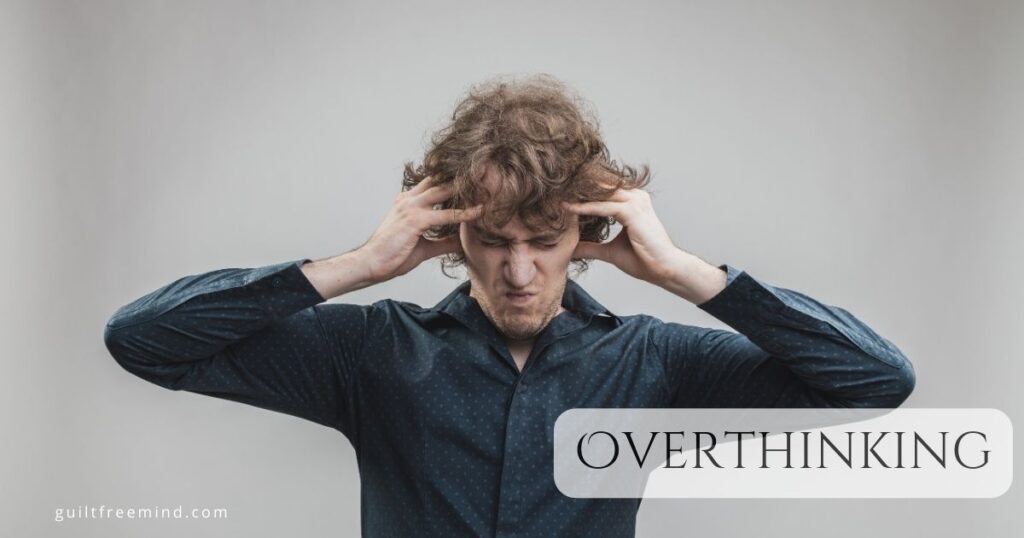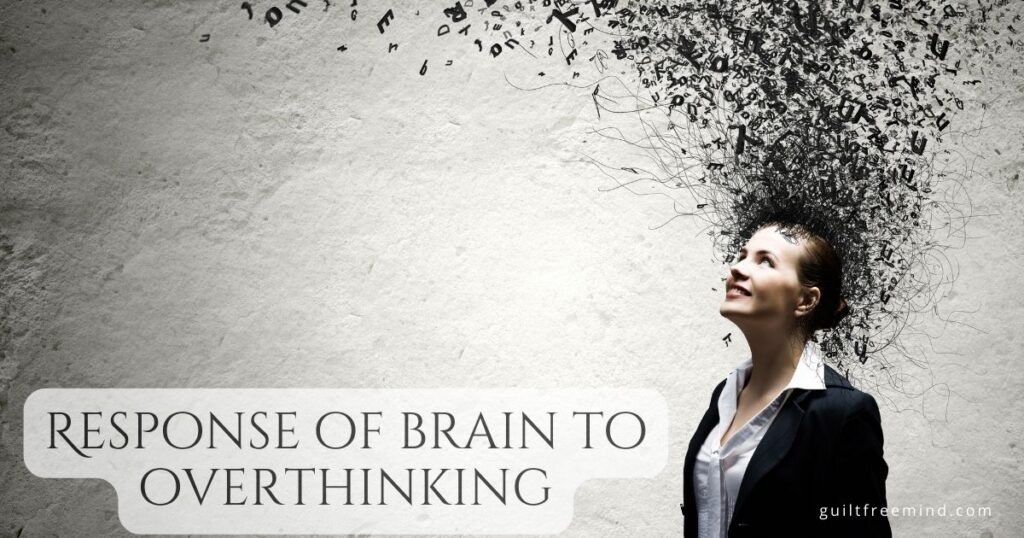Have you ever felt that you are stuck in a loop of thoughts? These thoughts are going on and on in your head like a movie on repeat. You try to focus on other things. However, you are unable to bring yourself out of it. This unending loop of miserable thoughts is called overthinking. Overthinking is a complicated and common experience that many people are affected by from time to time.
One thing you must understand is that engaging in this behavior from time to time is okay. Sometimes thoughts don’t go away and the negative thoughts take up residence in our mind for some time. However, if the scenario keeps replaying in your head time and time again, you get entangled in the thoughts and lose track of the present.
These ‘what if’ scenarios can ruin your present and make it impossible for you to have a decent future. You must realise that overthinking is like having a constant mental dialogue with the same concerns and thoughts swirling in your head. This makes it extremely difficult for you to find any peace or clarity.
In this blog post, I will discuss the overthinking phenomenon; what is overthinking, how to identify the signs and symptoms of overthinking, and finally, the effect of overthinking on your daily life.
If you wish to reduce your overthinking habit, lead a positive life and be more present at the moment, subscribe to Guilt Free Mind. The subscription option is present in the sidebar. If you like watching videos, subscribe to the YouTube channel of Guilt Free Mind. Don’t forget to ring the notification bell. This will make sure that YouTube notifies you the moment the next video goes live from the channel.

Table of Contents
Overthinking
In this fast world, where we barely have enough time to think, sometimes we get stuck in the loop of overthinking. This phenomenon tends to infiltrate into various aspects of our daily lives. Whether you are obsessing over a small decision, replaying a past conversation, or worrying about the outcome of an upcoming interview, overthinking can hamper and take over your emotional & mental well-being.
Some level of thinking is necessary. It allows us to perform better. However, overthinking tends to push us beyond productive thinking and lead us down a road that is filled with mental exhaustion, anxiety, and self-doubt. One thing I need you to understand before delving into the signs of overthinking is that this phenomenon is a struggle faced by many. This does not define your intelligence level in any way.
Understanding the signs of overthinking
The first step in battling overthinking is understanding the signs and symptoms of the same. Recognizing that overthinking is taking over you can help you put a stop to it before it reaches obsessive levels.
Signs of overthinking
- Repeatedly thinking of the same worries, fears, thoughts, and dreadful scenarios over and over again like a loop.
- Focussing only on the worst-case scenarios. Constantly replaying an awful scenario from the past.
- Spending a ton of time thinking thoughts regarding a doomsday scenario.
- Constantly feeling depressed and bogged down because of the negative thoughts in your head.
- Your mind is occupied by one thought to the point where you cannot focus on anything else.
- Constantly thinking about situations to which you have no solutions.
- Inability to leave a thought. The grip of the thought on your consciousness is so high that you cannot work on anything because you are constantly focused on that one thought in your head.
Is overthinking a disorder?
In itself, overthinking is not a disorder. However, research has found this to be a common symptom in the case of many other mental health conditions. Some of the mental health conditions that have overthinking listed as a symptom are:
- Anxiety disorders
- Depression
- Obsessive-compulsive disorder
- Post-traumatic stress disorder (PTSD).
Research studies have found a relationship between stress and overthinking. It has been named a chicken-and-egg type of situation. The presence of high levels of anxiety, stress, and depression can lead to and also exacerbate overthinking. On the other hand, constant overthinking also fuels depression, stress, and anxiety in the person.

When a person has been through a traumatic event, hypervigilance is a common response. The brain tends to expect danger at every turn and at all times. Those who engage in overthinking provide fuel to this figurative fire as well. Such people are constantly on edge and expect bad things to happen all the time. The brain tends to get stuck in the fight or flight response and keeps scanning for threats everywhere, all the time.
Cognitive processes engaged in overthinking
Several cognitive processes are involved in overthinking. These boost the positive feedback loop of constant rumination and analysis. The purpose of understanding the cognitive process contributing to overthinking is to help you understand why this habit is so hard to break free from. In the following sections, I will discuss some of the primary cognitive processes that boost the habit of overthinking.
Rumination
This is one of the primary features in the case of overthinking. I have already discussed rumination in the previous section. Rumination, the hallmark of overthinking involves constantly focusing on negative thoughts, experiences, and memories. Instead of distracting oneself or focusing on something else, overthinkers tend to stay stuck in the negative thought loop. They keep dwelling and thinking of the events in the past and the implications of the same. This continuous rehashing and rumination can boost stress and emotional stress. If this keeps going, it can make the person on only mentally but also physically ill.
Catastrophizing in overthinking
Another common tendency that overthinkers display is their tendency to catastrophize. Catastrophizing is when a person focuses on the worst outcome even if nothing bad has actually happened yet. They have a tendency to blow the smallest problems out of proportion and focus on the most negative outcome it can lead to. This habit boosts helplessness and heightens the feeling of anxiety.
Analysis paralysis
Another way overthinking manifests is as analysis paralysis. In this scenario, the volume of possibilities and information that the individual has to process is too much. This overwhelms the overthinker and they have a hard time reaching a decision or deciding how to react to the situation. Their mind becomes so overwhelmed that the person freezes and is not able to reach a conclusion.
Selective attention and confirmation bias
A crucial problem that overthinkers face is that they find it impossible to see the silver lining or view the glass as anything but half-empty. They are unable to see the positive side. Their brain discards the positive aspects and only focuses on the negative side of the problem. This continues to reinforce the negative thinking pattern and rumination. Confirmation bias further solidifies this belief by focusing only on that piece of information that boosts anxiety.

Overgeneralization
Overthinking leads to overgeneralization as well. Overthinkers tend to draw broad conclusions spanning similar aspects based on a limited set of experiences. For example: if the overthinker fails one job interview, he will convince himself that he is worthless and will never be able to get a job. No one wants him as an employee. He is not fit to even apply. When people look at him, all they see are his negative aspects. Thus, he convinces himself that he is not good enough for anything. Such thought patterns distort the person’s view of reality by leaps and bounds.
Perfectionism
There are many people who are perfectionists. However, perfectionism in overthinking is different. Overthinkers are their own biggest critic. Their quest for being perfect causes them to criticize their own performance. They try to think ten steps ahead, find out any potential issues or shortcomings. This habit of theirs can put a huge boulder on their progress and hinder any creativity.
The ‘what-if’ pattern of thinking in overthinking
‘What-if scenarios are another aspect that plagues overthinkers. They keep questioning the situation, focus on the worst outcomes, and finally, constantly worry about how they will resolve the upcoming conflict. This thinking style keeps the overthinker trapped in the uncertainty and anxiety cycle, unable to break free.
Emotional reasoning
Overthinking is the major reason behind the occurrence of emotional reasoning. Overthinkers refuse to believe that there might be a different way to look at and analyze the same scenario. As per them, how they feel is an accurate reflection of reality. If someone else even tries to show them another side, they will reject it. Furthermore, if they have a negative feeling about something, their brain convinces them that the situation is definitely threatening and impossible to navigate.
Mindreading
Overthinkers think for others. They cannot accept the facts as stated by the other person. Such individuals will add their own negative perception to the mix and use that thought. For example: suppose the boss said,” ‘You need to pick up your slack and perform better’. The overthinker will interpret this as, “My boss does not like my work at all. He has someone new in mind to hire. He will fire me any moment now.” Suppose a loved one says, “I don’t want to see such mistakes again”. The overthinker will interpret this as their loved one telling them that they are not worthy enough to be a part of the family. Their loved ones will shun them and the family will eventually cut ties with them.

The above-mentioned cognitive processes work to reinforce each other. This in turn creates a constant overthinking loop. If you want to break away from this pattern, it will require you to develop self-awareness, challenge the thought patterns and finally learn to redirect your cognitive energy towards a pattern of thinking that is more positive and constructive. Methods like cognitive restructuring, mindfulness, and self-compassion are crucial for overcoming the grip that overthinking has on the person and building a healthier mindset.
The response of the brain toward overthinking
The brain responds to overthinking by activating a complex interplay of neurobiological and neurochemical processes. When people engage in overthinking or are stuck in a difficult situation, the brain goes through different changes that lead to long-term and short-term effects on the physical and mental well-being of the individual. There is how the brain responds to overthinking:
Amygdala activation
Amygdala is a small almond-shaped structure present in the deep region of the brain. This entity has a crucial role to play in the processing of emotions, specifically anxiety, and fear. When an overthinking trigger occurs or when the person experiences high levels of stress, the amygdala becomes highly activated. It starts to perceive all kinds of threats in the environment and activates the fight or flight response of the body. This in turn causes the production of stress hormones like adrenaline and cortisol.
Involvement of the pre-frontal cortex in overthinking
The prefrontal cortex is located in the front region of the brain. It performs executive functions like problem-solving, impulse- control, and decision-making. In situations of overthinking or stress, the prefrontal cortex either becomes less effective or hyperactive. This impairs the person’s ability to make clear judgments or even think rationally. Thus, overthinkers find it impossible to break out of the rumination cycle and focus on finding a solution to the problem.
Impact on the hippocampus
The hippocampus is responsible for the formation of memories. It is also affected when a person engages in overthinking. The production of high levels of stress hormones like cortisol can cause damage to the hippocampus in turn, causing a shrinkage. This leads to issues in memory and difficulty in recalling and remembering the information.
Imbalance in neurotransmitter levels
If a person constantly engages in overthinking and stress, it can cause disruption in the neurotransmitter balance in the brain, especially serotonin and dopamine. Serotonin is responsible for mood regulation. Low levels of this neurotransmitter can act as a cause of depression and anxiety. Dopamine is responsible for reward and motivation. Reduction in the levels of dopamine leads to reduced interest in any activities.

Effect on overthinking on the hypothalamic-pituitary-adrenal (HPA) axis
HPA axis is the name given to the interplay between the adrenal glands, pituitary gland, and hypothalamus. The primary role of the HPA axis is to regulate how the body responds to stress. Chronic overthinking and stress dysregulate the HPA axis causing a prolonged activation of the stress response. This in turn exacerbates the production of cortisol.
Altered brain connectivity
Neuroimaging studies show that overthinking and chronic stress cause alteration in brain connectivity patterns.The brain regions involved in the regulation of emotions like the prefrontal cortex and amygdala show heightened connectivity. As a result, there is a surge in emotional responses and cognitive processing.
Common overthinking triggers
Various internal and external factors can trigger overthinking in a person. These triggers are different for different individuals. However, there are some common triggers of overthinking:
Uncertainty
Overthinkers cannot deal with uncertainty. Uncertain situations cause their anxiety to go through the roof. Overthinkers struggle to handle the discomfort of not knowing what might happen. They may try to analyze every possible outcome and focus on the negative ones primarily.
Perfectionism
In the previous sections, I discussed perfectionism as a characteristic of overthinkers. However, perfectionism is also a trait that boosts overthinking. Since such people are constantly worried about the outcome, they want everything they do to be perfect. Their desire to do everything perfectly, causes them to excessively analyze every decision and action to avoid committing mistakes.
Guilt and regret
Those who engage in overthinking constantly worry about their past mistakes, and what they could have done instead to avoid the outcome. Such regret and guilt constantly haunt an overthinker.

Social interactions
Social interactions act as another trigger for overthinking. If a person engaging in overthinking encounters an embarrassing situation in a social setting, they will keep repeating it in their head and worrying about what others might think of them.
Fear of the future
As I mentioned before, overthinkers are constantly in a ‘what-if’ situation about their future. What if this goes wrong, what if that goes wrong? This constant worry about the future dismantles their chance of having a normal present life.
Comparison and self-doubt
Those who engage in overthinking constantly compare themselves with others. When they find a trait others have but they don’t, they allow their inferiority complex to boost up. This constant comparison, self-doubt, and inferiority complex prompts overthinkers to keep questioning their decisions and abilities.
Traumatic experiences
Even normal people overthink after experiencing a traumatic event. However, if the person who experienced a traumatic experience is an overthinker, their overthinking becomes 50✗ worse. They constantly keep playing the distressing and traumatic events from their past as intrusive thoughts. This makes it impossible for them to break out of the loop of the overthinking process.
Loss of control
If a person who engages in overthinking feels powerless, they will start to engage in an excessive thinking process. They will constantly worry about things that are not in their control. They will also try to find a way to escape the problem even though they have no control over it whatsoever.

Procrastination
Overthinkers cannot stop thinking. Their constant thinking causes them to procrastinate. Worrying that they are procrastinating, they will think of the consequences they will have to face if they don’t get the task completed before the deadline. In other words, they waste their time thinking of the results of not finishing their task instead of actually getting the task done.
Decision making
When such people have to take an important decision, they try to go through and weigh all of their options and focus on all of the possible consequences. This causes them to take a long time to decide and even after that, they are worried if their decision was the right one in the first place.
Negative self-talk
Overthinkers constantly engage in self-criticism and negative self-talk. This causes them to keep thinking negatively about themselves and boosts their negative self-image. They are constantly running in a loop where they feel they are worthless. Any negative scenario occurring in their present scenario only boosts their negative self-image.
Absence of distractions
When such individuals are not engaging in any activities or are sitting idle, they start to ruminate and conduct excessive analysis. They go so deep in their thoughts and analysis process that they cannot distract their mind. Furthermore, the constant rumination convinces these individuals that they cannot distract themselves even if they wish to.
It is crucial to recognize these triggers. Understanding the triggers with give you an insight into why and how overthinking occurs. When you understand the thoughts and situations, you can start applying coping strategies to redirect the focus and break out of the rumination cycle.
The connection between overthinking with health
Overthinking is much more than a bad habit. It can negatively impact physical and mental health. The constant worry and rumination that accompany the process of overthinking can lead to various health issues in the overthinker. It is crucial to understand the relationship between overthinking and health so you can take proactive steps to break out of this pattern of thinking negatively in a loop. Let’s do a deep dive into the effects of overthinking on health.
Chronic anxiety and stress
As has been mentioned before, anxiety as well as stress fuels the process of overthinking. Since overthinkers constantly ruminate over worry or past events, their minds and bodies are continuously in a heightened alert state. This, in turn, triggers the release of stress hormones like cortisol. If a person is constantly under effect of such hormones, the levels of anxiety increase and in turn, exacerbate any mental health condition the person might be facing.

Disturbances in sleep patterns
If a person is constantly ruminating over the past and certain negative thoughts, it will have an impact on their ability to fall asleep or stay asleep. In case the overthinker already suffers from insomnia or other sleep disturbance, overthinking can exacerbate this condition. Constant rumination aggravates anxiety and sleep disturbance. In the same way, sleep disturbance and anxiety further fuel overthinking boosting the problem further.
Cognitive impairment and mental exhaustion
Constantly engaging in thinking, coming up with possible scenarios, and focusing on negative thoughts can have a serious impact on your brain capacity Most of the resources of your brain get engaged in the rumination process. This leads to a reduction in the amount of brain power to perform other cognitive tasks. It also causes mental fatigue. Overthinkers are mostly mentally tired. They find it hard to focus on the task at hand, face memory problems, and a reduction.in problem-solving abilities.
Effect on emotional well-being
Overthinking takes a huge toll on one’s emotions. It causes irritability, emotional exhaustion, anger, and mental drain. Constantly being in this state increases feelings of frustration, hopelessness, and sadness. Being stuck in a loop of ‘I don’t deserve happiness in my life’ makes it hard for such individuals to accept happiness even when they are staring at it right in the face.
Physical symptoms
The body and mind are very closely connected. Stress on the mind leads to stress on the body as well. Thus, overthinking can lead to physical symptoms as well. Some of the common overthinking symptoms are muscle tension, gastrointestinal problems, headaches, and a weakened state of immune system.
Effect of overthinking on relationships
Since the overthinker is constantly engaged in rumination, they do not pay enough attention to their partner or loved ones. In some cases, they may also push their loved ones away, afraid that the loved ones will leave them one day. Such people also struggle with communication. Their habit of mind reading lands them in communication problems as they may think on behalf of their loved ones and their thoughts (always negative) may not be on the right track. Such activities put thorns in their personal relationships with others.

Reduction in the quality of life
Being in a constant mental state of preoccupation and worry can blur the lines between thoughts and reality. Unfortunately, overthinking makes it impossible for overthinker to enjoy the good parts of life because they are always waiting for bad things to happen. In fact, such tendencies hinder the personal growth of the individual and reduce their ability to gain satisfaction.
Compromised decision making
Since overthinkers are constantly afraid of making mistakes, they are in a constant struggle to make proper decisions. Another common struggle they face is that they are constantly second-guessing their choices. This can lead to such individuals missing out on crucial opportunities and the absence of progress in different aspects of their life.
How to break free from overthinking?
If you want to get back to a normal life, breaking free from overthinking is the first step towards it. In order to break free, you must first learn to recognize the wrong thinking patterns, challenge the negative thoughts and implement coping strategies. If you want to know the coping strategies and how to handle overthinking, subscribe to Guilt Free Mind so that you do not miss the next blog post that will be on the strategies to overcome overthinking.
The only way to beat this demon is to take proactive steps to address the problem at every step. Always remember to question the problem, question your thinking patterns, and finally focus on mindfulness and overall health.
Conclusion
Overthinking impacts all of us at some point or another. However, overthinkers are constantly engaged in the process of rumination. As a result, this has a negative impact on their health, mental capacity, and overall health.
The first and foremost thing to understand is that recognizing overthinking means understanding the causes of overthinking, the negative thoughts, and the habit of rumination and challenging them at every step. Furthermore, methods like journaling, meditation, and professional support are primary methods for managing overthinking. To know the exact steps to combat overthinking, subscribe to Guilt Free Mind so I can notify you the moment the next blog post releases. If you like watching videos, subscribe to the YouTube channel of Guilt Free Mind. Last but not least, do not forget to ring the notification bell and set it to ALL so that YouTube notifies you the moment the next video is out.
See you in my next blog post
Dr. Shruti
